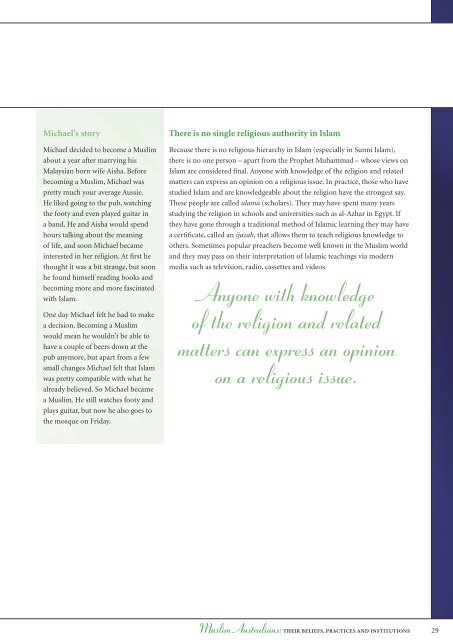Muslim Australians - Religion Cultural Diversity Resource Manual
http://www.islamicglobe.com
http://www.islamicglobe.com
You also want an ePaper? Increase the reach of your titles
YUMPU automatically turns print PDFs into web optimized ePapers that Google loves.
Michael’s story<br />
Michael decided to become a <strong>Muslim</strong><br />
about a year after marrying his<br />
Malaysian born wife Aisha. Before<br />
becoming a <strong>Muslim</strong>, Michael was<br />
pretty much your average Aussie.<br />
He liked going to the pub, watching<br />
the footy and even played guitar in<br />
a band. He and Aisha would spend<br />
hours talking about the meaning<br />
of life, and soon Michael became<br />
interested in her religion. At first he<br />
thought it was a bit strange, but soon<br />
he found himself reading books and<br />
becoming more and more fascinated<br />
with Islam.<br />
One day Michael felt he had to make<br />
a decision. Becoming a <strong>Muslim</strong><br />
would mean he wouldn’t be able to<br />
have a couple of beers down at the<br />
pub anymore, but apart from a few<br />
small changes Michael felt that Islam<br />
was pretty compatible with what he<br />
already believed. So Michael became<br />
a <strong>Muslim</strong>. He still watches footy and<br />
plays guitar, but now he also goes to<br />
the mosque on Friday.<br />
There is no single religious authority in Islam<br />
Because there is no religious hierarchy in Islam (especially in Sunni Islam),<br />
there is no one person – apart from the Prophet Muhammad – whose views on<br />
Islam are considered final. Anyone with knowledge of the religion and related<br />
matters can express an opinion on a religious issue. In practice, those who have<br />
studied Islam and are knowledgeable about the religion have the strongest say.<br />
These people are called ulama (scholars). They may have spent many years<br />
studying the religion in schools and universities such as al-Azhar in Egypt. If<br />
they have gone through a traditional method of Islamic learning they may have<br />
a certificate, called an ijazah, that allows them to teach religious knowledge to<br />
others. Sometimes popular preachers become well known in the <strong>Muslim</strong> world<br />
and they may pass on their interpretation of Islamic teachings via modern<br />
media such as television, radio, cassettes and videos.<br />
Anyone with knowledge<br />
of the religion and related<br />
matters can express an opinion<br />
on a religious issue.<br />
<strong>Muslim</strong> <strong>Australians</strong>:THEIR BELIEFS, PRACTICES AND INSTITUTIONS 29














